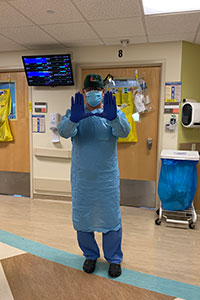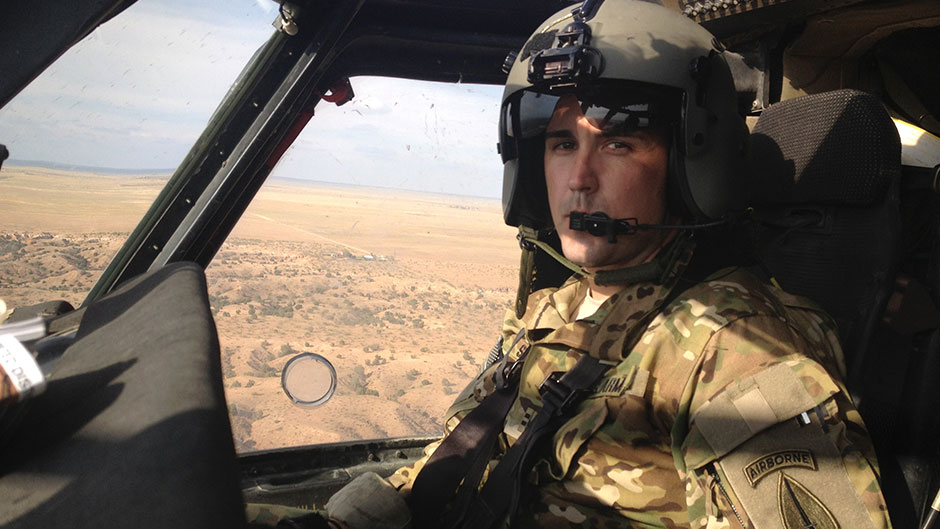On his first day as a critical care nurse in June 2020, Taylor Skelton, B.S.N. ’20, arrived early to his shift, only to find out that he would be working in the COVID-19 intensive care unit.
Soon, he was in the rooms with the sickest patients, learning about chest compressions, reading chest X-rays to look at the disease’s effects on the lungs, reviewing medications, and learning how to protect himself and others.
“It was terrifying,” Skelton recalls. “Not only is this a terrible disease that we know nothing about, but you’re also the new guy. And you know what you’re doing, but at the same time, you don’t want to hurt anyone. I didn’t even know how to put all this gear on.”
But despite his fears, the father of two did not hesitate to jump in and help, thanks to a sense of action and purpose gained during his 21-year career in special operations in the U.S. Army, and to the skills and knowledge acquired at the University of Miami School of Nursing and Health Studies.
Skelton grew up in Phoenix, Arizona, the oldest of three. He remembers a childhood spent outside—hiking, fishing, and “doing young boy stuff out in the desert.” When he turned 18, he took the written exam to become a firefighter, his dream at the time. He didn’t pass, and an Army ranger at the fire department suggested that Skelton join the Army for a few years to gain some experience and then retake the test.
Skelton, in the decisive manner that has defined much of his career, did just that. The only difference is that a few years turned into 21 and the adventure of a lifetime.
“Once I got into training,” he says, “I really enjoyed what I was doing. One day I’d be out at the range shooting all day, and the next night we’d be jumping out of airplanes. Of course, there were challenges, and as a kid going into the Ranger Regiment, which is a very serious organization with an important mission, I had to grow up fast.”
He eventually became a helicopter pilot, flying hundreds of hours without incident. He was deployed to special operations missions in Iraq and Afghanistan, helped capture insurgents, and was involved in surveillance missions. He also served as a medical evacuation pilot, special operations pilot, and instructor pilot.
It was Skelton’s wife, a physician he met in Fort Campbell, Kentucky, who inspired him to pursue a career in medicine. He initially considered medical school, but after a day shadowing critical care nurses, he knew he had found his next mission.
Skelton’s last day in the Army was in April 2019. One month later, he began the accelerated Bachelor of Science in Nursing degree at the University of Miami. He made the Dean’s List and received the Florence Bayuk Nursing Educational Trust Fund Scholarship. He also joined a number of student organizations, including the Veterans Student Organization.
 Immediately after graduating in May 2020, Skelton began his job as an intensive care nurse at Holy Cross Hospital in Fort Lauderdale, Florida. “The simulation-based training and education I received at the U gave me a solid base to get in there and be a contributing member of the team,” he says.
Immediately after graduating in May 2020, Skelton began his job as an intensive care nurse at Holy Cross Hospital in Fort Lauderdale, Florida. “The simulation-based training and education I received at the U gave me a solid base to get in there and be a contributing member of the team,” he says.
And he enjoyed what he was doing. “I’m very fortunate to have gone from graduating into an ICU setting,” he says. “I was finally out of school, and it was time to get in the fight and start helping.”
Skelton now works full-time in the cardiovascular ICU. He hopes to eventually become a Certified Registered Nurse Anesthetist and to encourage other veterans to look towards nursing.
“Nursing is a great field for veterans,” he says. “Our work ethic, our sense of responsibility, our sense of duty to community and country all blend in well with nursing. And you’re helping others. That’s what we did in the military and so, to carry that on with nursing or medicine, is great. We’re caring for people at the worst time of their life.”

